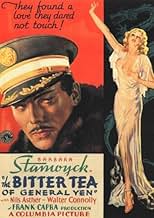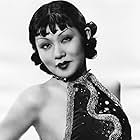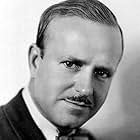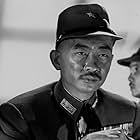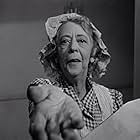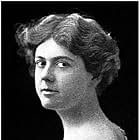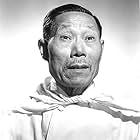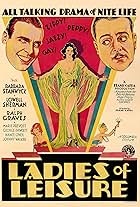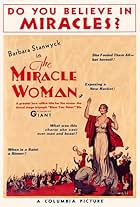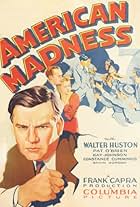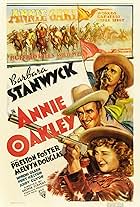A Chinese warlord and an engaged Christian missionary fall in love.A Chinese warlord and an engaged Christian missionary fall in love.A Chinese warlord and an engaged Christian missionary fall in love.
- Awards
- 1 win
- Mrs. Blake
- (uncredited)
- Mrs. Jackson
- (uncredited)
- Missionary
- (uncredited)
- Missionary
- (uncredited)
- Chinese Officer
- (uncredited)
- Dr. Hansen
- (uncredited)
- Officer
- (uncredited)
- Mrs. Bowman
- (uncredited)
- Mrs. Amelia Hansen
- (uncredited)
- Director
- Writers
- All cast & crew
- Production, box office & more at IMDbPro
Storyline
Did you know
- TriviaThe Bitter Tea of General Yen was the first film to play at Manhatten's fabled Radio City Music Hall upon its opening on January 6, 1933. It was also one of the first films to deal openly with interracial sexual attraction. It was a box office failure upon its release and has since been overshadowed by Capra's later efforts. In recent years, the film has grown in critical opinion. In 2000, the film was chosen by film critic Derek Malcolm as one of the 100 best films in The Century of Films.
- GoofsThe beginning sequence takes place as the text reading the "Burning of Chapei" is flashed on the screen. The burning of Chapei occurred on September 18, 1931, while the film was still in production. The film follows the original novel, which was set in the late 1920s during the Chinese Civil War. The Chinese Civil War was clearly integrated into the plot of the film. Little, if any, of the plot makes reference to the Japanese/Chinese conflict of 1931-1932. None of the characters in film are identified as Japanese. Capra wanted it to be an Academy Award contender and hoped to create interest by adding this connection to the timely events.
- Quotes
Megan Davis: Can't you forgive her? She's only a child. You can always do so much more with mercy than you can with murder. Why don't you give her another chance? Oh, I know you feel that she has deceived you and sold information to your enemies; perhaps, even been unfaithful to you. All that's dreadful and if its true you have a certain justification in wanting to crush her. But, I want you to think of all those things and then forgive her. I don't know how you feel about Mah-Li; I mean, whether you love her or, well, as a lover. But, that's of no importance. I want you to see the beauty of giving love where it isn't merited. Any man can give love where he's sure of its return. That isn't love at all. But, to give love with no merit, no thought of return, no thought of gratitude even; that's ordinarily the privilege of God. And now its your privilege. Oh, General, with all you have within you, your superior brain, your culture, how can you be so blind to spiritual braveness? Do this thing I ask you. Do it for me. Do it even blindly, if you must, and I promise you, I'm so sure of it, I promise you that for the first time in your life you'll know what real happiness is.
- ConnectionsFeatured in Frank Capra's American Dream (1997)
- SoundtracksOnward Christian Soldiers
(1871) (uncredited)
Music from "St. Gertrude" by Arthur Sullivan (1871)
Lyrics by Sabine Baring-Gould (1865)
Sung by an unidentified quartet at the wedding
It's a message that infers some tendencies to prejudices on both sides, of the white well-educated woman who sees to do good wherever she can and the stalwart General who will try to impress and act cordial around the lady but mostly because he wants to have his way- which may be with her. The story itself sounds kind of typical, probably because by today's standards it is: Megan Davis has just come to China to do missionary work but is caught in the midst of a bad civil war going on, and after a tumultuous battle she gets caught up in in the streets and is knocked out is taken into the 'care' of General Yen (Nils Asther, no, not Chinese apparently but does so good a job as to not notice *too* much). She cannot leave his custody at his palace because of the battling blocking up the train tracks, and has to stick tight... in the span of a week she tries to spare a life of a spy and almost falls for Yen, or maybe more than almost.
It's actually the one complicated and really exacting thing in this production is seeing Asther and Stanwyck on screen. I'm not sure if the latter gave quite a great performance, but for what she's given she elevates it into a stern-faced but kind-hearted portrayal of a woman caught in an untenable situation, and Asther gives as good as he can by bypassing the obvious pit-fall of stereotyping by making Yen a very human figure. He's a man of class and taste but also tradition and with that typical double-edged sword of being ruthless with slaughter and elegant in decorum and in attitude. Somehow Capra is able to garner very good work from them with a story that, in the wrong hands, could become the most ham-fisted thing on the planet.
Luckily not only is Capra uncompromising in dealing with the issues at hand both upfront and underlying in terms of race and ethnicity and just the clashing of cultures, but in technical terms with the bits of battle scenes (the shoot-out late in the film at the train station is breathtaking for 1933 and pretty good for today), and it shows a director so confident in his craft that he could be ready for better things. It might be dated... actually, it is dated. But for any and all faults, it's a picture made with surprising sensitivity and compassion for all its characters, and it doesn't stick to clichés just for the sake of it - it's a solid drama without much pretension, save for a dream sequence that's actually hallucinatory in the best way.
- Quinoa1984
- Jan 25, 2009
- Permalink
Details
- Runtime1 hour 28 minutes
- Color
- Aspect ratio
- 1.37 : 1
Contribute to this page





